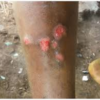Understanding Alopecia Areata: An Ayurvedic Perspective
Understanding Alopecia Areata: An Ayurvedic Perspective is an autoimmune condition characterized by sudden hair loss in patches. While it can affect anyone, its unpredictable nature can lead to emotional distress and self-esteem issues. While conventional treatments exist, many people seek alternative therapies, including Ayurveda. This ancient Indian system of medicine emphasizes a holistic approach, focusing on the body, mind, and spirit. This blog explores alopecia areata through the lens of Ayurveda, offering insights into its causes, treatments, and lifestyle modifications.
What is Alopecia Areata?

Alopecia areata occurs when the immune system mistakenly attacks hair follicles, leading to hair loss. The extent of hair loss can vary; some people may experience complete baldness (alopecia totalis) or even total loss of body hair (alopecia universalis). Although the exact cause remains unclear, factors such as genetics, stress, and environmental triggers are believed to play a role.
Ayurvedic Understanding of Alopecia Areata
In Ayurveda, health is defined by the balance of three doshas: Vata, Pitta, and Kapha. Each dosha represents different biological functions and elements. Alopecia areata can be viewed as an imbalance in these doshas, particularly an aggravation of Vata and Pitta.
- Vata Dosha: This dosha is associated with air and space, governing movement and communication within the body. An imbalance can lead to dryness and instability, affecting hair health.
- Pitta Dosha: Associated with fire and water, Pitta governs transformation and metabolism. An excess can cause inflammation and heat, which may contribute to hair loss.
- Kapha Dosha: This dosha embodies earth and water, providing structure and stability. While it is less directly related to alopecia areata, an imbalance can affect overall health and vitality.
Causes of Alopecia Areata in Ayurveda
According to Ayurveda, alopecia areata can stem from various internal and external factors:
- Stress and Emotional Factors: High levels of stress can trigger Vata imbalances, leading to hair loss.
- Poor Diet: Consuming excess processed foods, spicy, or acidic foods can aggravate Pitta and lead to inflammation.
- Toxins (Ama): Accumulation of toxins in the body can disrupt the balance of doshas and lead to various health issues, including alopecia.
- Genetic Predisposition: Family history can play a significant role, as imbalances may be inherited.
Ayurvedic Treatments for Alopecia Areata
Ayurveda offers a range of treatments that focus on restoring balance to the doshas and promoting hair growth. Here are some common approaches:
1. Herbal Remedies
Ayurveda emphasizes the use of natural herbs to treat various ailments, including alopecia areata. Some effective herbs include:
- Bhringraj (Eclipta alba): Known as the “king of herbs,” bhringraj is believed to nourish the hair and promote growth. It can be applied as an oil or taken as a supplement.
- Amla (Emblica officinalis): Rich in vitamin C and antioxidants, amla supports hair health and may prevent premature graying.
- Ashwagandha (Withania somnifera): This adaptogen helps manage stress and supports the immune system, potentially reducing the autoimmune response.
- Neem (Azadirachta indica): Known for its antibacterial and anti-inflammatory properties, neem can help cleanse the scalp and reduce inflammation.
2. Oil Massages
Regular scalp massages with herbal oils can improve circulation and nourish hair follicles. Recommended oils include:
- Coconut Oil: Known for its moisturizing properties, it can help keep the scalp healthy and prevent dryness.
- Castor Oil: Rich in ricinoleic acid, castor oil may promote hair growth and strengthen existing hair.
- Bhringraj Oil: This oil is specifically formulated to stimulate hair growth and reduce hair loss.
3. Dietary Recommendations
A balanced diet is crucial for maintaining overall health and hair quality. Ayurvedic dietary recommendations include:
- Incorporating Sattvic Foods: Fresh fruits, vegetables, whole grains, and nuts promote overall health and reduce stress.
- Avoiding Pitta-Aggravating Foods: Minimize spicy, acidic, and fried foods to prevent inflammation.
- Staying Hydrated: Drinking plenty of water supports detoxification and overall well-being.
4. Lifestyle Modifications
Ayurveda emphasizes the importance of a balanced lifestyle in promoting health and preventing disease. Some key lifestyle recommendations include:
- Stress Management: Practicing yoga, meditation, and mindfulness can help manage stress and restore balance to the doshas.
- Adequate Sleep: Quality sleep is essential for overall health, including hair health. Aim for 7-8 hours of restful sleep each night.
- Regular Exercise: Physical activity helps improve circulation, reduce stress, and promote overall well-being.
5. Panchakarma Therapy
Panchakarma is a cleansing and rejuvenating therapy in Ayurveda that involves a series of treatments to detoxify the body. It can be particularly beneficial for individuals with alopecia areata, as it helps restore balance to the doshas. Common Panchakarma treatments include:
- Abhyanga: A full-body oil massage that promotes relaxation and improves circulation.
- Shirodhara: A treatment where warm herbal oil is poured onto the forehead, promoting relaxation and reducing stress.
- Virechana: A therapeutic purgation process that helps eliminate toxins from the body.
Conclusion
Alopecia areata can be a challenging condition, both physically and emotionally. While conventional treatments may offer some relief, Ayurveda provides a holistic approach that addresses the root causes of the condition. By restoring balance to the doshas, incorporating herbal remedies, and making lifestyle modifications, individuals can promote hair health and overall well-being.
Always consult a qualified Ayurvedic practitioner before starting any new treatment regimen, as personalized advice is crucial in addressing specific health needs. With patience and commitment, it is possible to manage alopecia areata and improve the quality of life.








Leave a reply